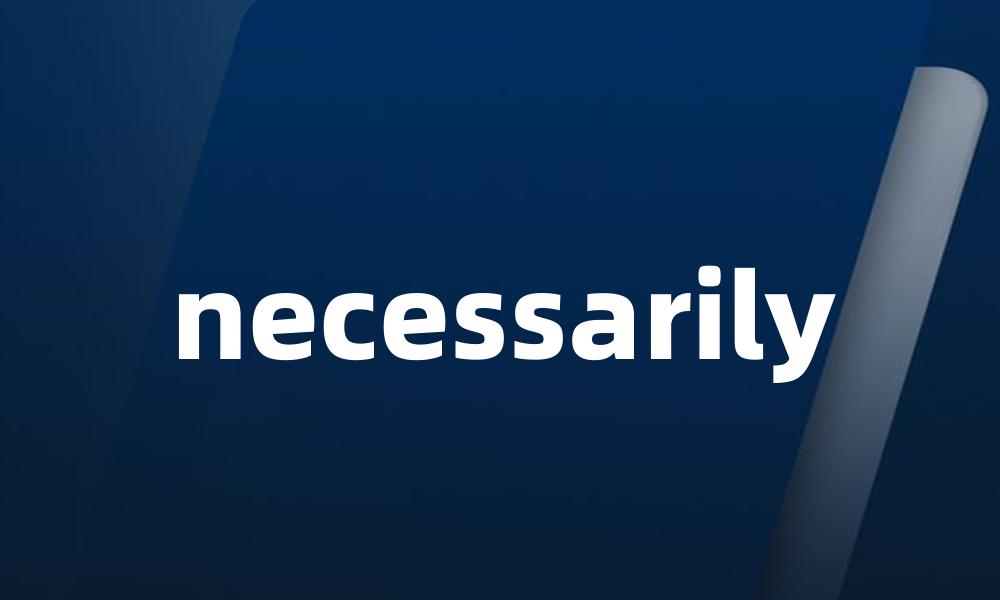
中英词典:necessarily
形容词
- 必然的;必定的 - happening or existing as a natural or logical result of something
- 必要的;不可避免的 - required by the circumstances or by logic; inevitable
名词
- 必然性;必然的事情 - the quality or fact of being necessary; something that must be done or is inevitable
词语辨析
necessarily 和 inevitably 都表示“不可避免地”或“必然地”,但 necessarily 更强调逻辑上的必然性,而 inevitably 则更强调客观上的必然性。
词汇扩充
形容词:necessary, essential, required, indispensable, imperative
名词:necessity, requirement, need, essential
近义词
inevitably, inevitably, unavoidably, of necessity, certainly, surely
反义词
unnecessarily, optionally, avoidably, possibly
柯林斯词典
necessarily (adverb): If something necessarily happens or is the case, it cannot be avoided or prevented.
牛津词典
necessarily (adverb): As a necessary result; inevitably.
用法
necessarily 可以用作副词修饰动词、形容词或句子。
例句
- Winning is not necessarily the most important thing; it's the taking part that counts. (获胜不一定是最重要的,参与才是最重要的。)
- It is not necessarily true that she will always be successful. (她并不一定会一直成功。)
- Some people believe that economic growth and environmental protection are necessarily incompatible. (有些人认为经济增长和环境保护必然是不相容的。)
- Not all problems can be necessarily solved by technology. (并不是所有问题都能用技术必然解决。)
- His comments were not necessarily directed at you. (他的评论并不一定是针对你的。)
- It is necessarily true that all living organisms require water to survive. (所有生物都需要水才能生存,这是必然的事实。)
- Freedom of speech is not necessarily absolute. (言论自由不一定是绝对的。)
- She didn't necessarily mean to be rude, but her comments were taken the wrong way. (她并不是故意无礼的,但她的评论被误解了。)
- Not all changes are necessarily improvements. (并不是所有的变化都是改进。)
- He may not be here, but that doesn't necessarily mean he's not interested. (他可能不在这里,但这并不一定意味着他不感兴趣。)
- The decision was necessarily difficult, but it had to be made. (这个决定必然很难,但必须做出来。)
- They necessarily had to cut costs in order to survive the economic downturn. (为了在经济衰退中生存下去,他们必须削减成本。)
- Not all problems can be solved necessarily by throwing money at them. (并不是所有的问题都能通过投钱解决。)
- He didn't necessarily mean to offend you; he just has a blunt way of speaking. (他并不是故意冒犯你,他只是说话很直接。)
- Being busy doesn't necessarily mean being productive. (忙碌并不一定意味着高效率。)
- Not all students who work hard will necessarily achieve high grades. (并不是所有努力学习的学生都会取得高分。)
- He is not necessarily the best candidate for the job; there are others who are equally qualified. (他并不一定是这个工作的最佳候选人;还有其他同样合格的人。)
- Learning a new language doesn't necessarily mean you'll become fluent. (学一门新语言并不一定意味着你会变得流利。)
- Not all successful individuals are necessarily happy. (并不是所有成功的人都一定快乐。)
- The answer to the problem may not be necessarily obvious at first glance. (问题的答案并不一定一眼就能看出来。)

 小皮
小皮